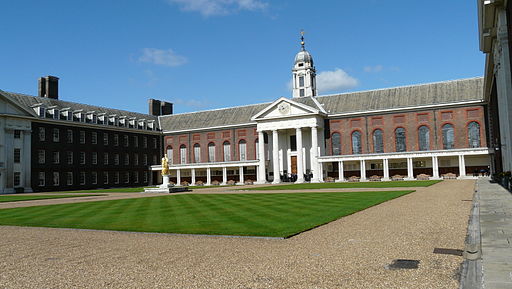 |
| Camster2, CC BY-SA 3.0, via Wikimedia Commons |
Each year, the hospital holds a parade to mark the hospital's founding by King Charles II (reigned 1660 -1685). The parade is usually held in late May/early June, close to King Charles II's birthday (May 29nd). The parade is attended each year by a member of the Royal Family.
The Royal Hospital Chelsea's Founder's Day, is also known as Oak Apple Day and the Pensioners will wear Oak branches on their uniforms. The Oak reference commemorates the escape of the future King Charles II after the Battle of Worcester (1651) when he hid in an oak tree to avoid capture by the Parliamentary forces.
King Charles III's Reign
| Year | Royal | Notes |
|---|---|---|
| 2020s | ||
| 2029 | - | - |
| 2028 | - | - |
| 2027 | - | 335th Parade |
| 2026 | - | - |
| 2025 | Prince Edward | - |
| 2024 | Princess Anne & Sir Tim | 80th Anniversary of D-Day |
| 2023 | King Philippe & Queen Mathilde of Belgium | To make-up for Canceled attendance in 2022. |
Queen Elizabeth II's Reign
Queen Elizabeth attended the Founder's Parade 4 times during her reign, during milestone years.
When two royals attended the Reviewing Officer is the more senior royal.
The list is not complete.
| Year | Royal |
|---|---|
The 2020s
|
|
| 2022 | Sir Tim Laurence (Princess Anne canceled) (King Philippe canceled as his State Visit to DR Congo was postponed from Feb 2022 to June 2022 due to the war in Ukraine.) (330th Parade) |
| 2021 | Duke & Duchess of Gloucester |
| 2020 | Duchess Camilla (Postponed due to Pandemic) |
The 2010s
|
|
| 2019 | Prince Harry (75th Anniversary of D-Day) |
| 2018 | Prince & Princess Michael of Kent |
| 2017 | Prince Edward |
| 2016 | Princess Anne & Sir Tim |
| 2015 | Prince Andrew |
| 2014 | Duke of Kent |
| 2013 | Duchess Camilla |
| 2012 | Countess Sophie |
| 2011 | Prince Harry |
| 2010 | Duke of Gloucester |
The 2000s
|
|
| 2009 | Princess Alexandra |
| 2008 | Princess Anne |
| 2007 | Queen Margrethe of Denmark (315th Parade) (King Constantine & Queen Anne-Marie of Greece also attended) |
| 2006 | Queen Elizabeth & Prince Philip |
| 2005 | Prince Charles & Duchess Camilla |
| 2004 | Duke and Duchess of Gloucester |
| 2003 | ? |
| 2002 | Queen Elizabeth (at Buckingham Palace to celebrate Golden Jubilee, 50th Anniversary of Accession) (310th Parade) |
| 2001 | Princess Alexandra |
| 2000 | Duke of Kent |
The 1990s
|
|
| 1999 | Prince Charles |
| 1998 | Prince Edward |
| 1997 | Prince Philip |
| 1996 | ? |
| 1995 | ? |
| 1994 | Duchess of Kent |
| 1993 | ? |
| 1992 | Prince Charles & Princess Diana (300th Parade) |
| 1991 | ? |
| 1990 | ? |
The 1980s
|
|
| 1989 | |
| 1988 | |
| 1987 | Duchess Sarah |
| 1986 | |
| 1985 | Princess Anne |
| 1984 | |
| 1983 | Princess Diana |
| 1982 | Queen Elizabeth (300th Anniversary of Hospital) |
| 1981 | |
| 1980 | Duchess of Kent |
The 1970s
|
|
| 1979 | |
| 1978 | Prince Philip |
| 1977 | |
| 1976 | |
| 1975 | |
| 1974 | |
| 1973 | |
| 1972 | Princess Anne |
| 1971 | |
| 1970 | |
The 1960s
|
|
| 1969 | |
| 1968 | |
| 1967 | |
| 1966 | Queen Mum |
| 1965 | |
| 1964 | |
| 1963 | Queen Mum |
| 1962 | Queen Elizabeth (10th Anniversary of Accession) |
| 1961 | |
1960
|
|
The 1950s
|
|
| 1959 | |
| 1958 | |
| 1957 | |
| 1956 | |
| 1955 | |
| 1954 | Princess Margaret? |
| 1953 | |
| 1952 | |
So this is a very minor detail, but it's a mistake I've seen pop up a few times: the title of the Belgian monarchs is not "King/Queen X of Belgium", but "King/Queen X of the Belgians". They do have the "of Belgium" sometimes, but it's more like a last name. So referring to the current king as "King Philippe of Belgium" would be similar to referring to King Charles III as "King Charles Windsor-Mountbatten".
ReplyDeleteNot a mistake. Both King of Belgium & King of the Belgians are acceptable ways of referring to him in English. And you will see King of Belgium used a lot officially. In Latin the phrase King of Belgium could be confused for King of Netherlands. So when Belgium separated from the Netherlands, they had to write the title in Latin in a different way so it would be clear. And that was then adapted for other languages.
ReplyDeleteBut we don’t need that distinction in English. And both King of Belgium & King of the Belgians is an acceptable way to refer to the King. And you will see both widely used by officials including numerous monarchies.
I always prefer to refer to Monarchs by their country noun, not adjective as that is more Plain English. And consistent.
- Gert’s Royals